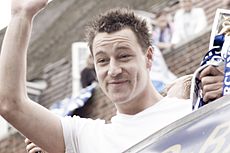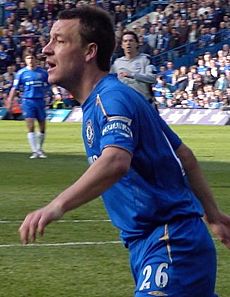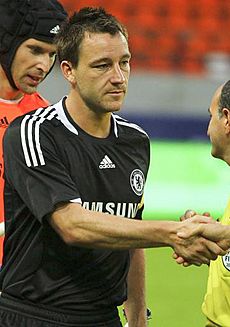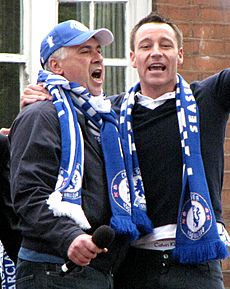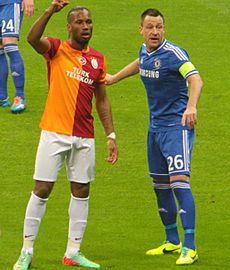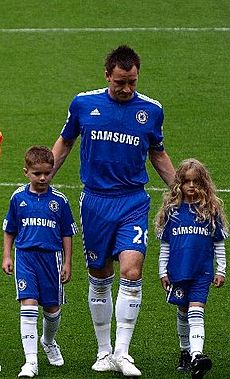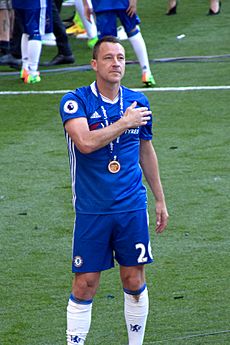John Terry facts for kids
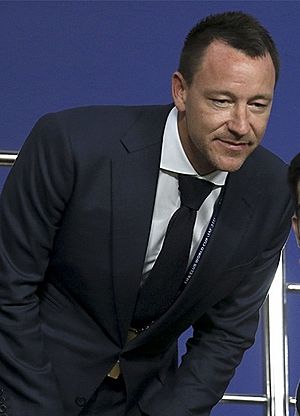
Terry in 2022
|
|||
| Personal information | |||
|---|---|---|---|
| Full name | John George Terry | ||
| Date of birth | 7 December 1980 | ||
| Place of birth | Barking, Greater London, England | ||
| Height | 6 ft 2 in (1.87 m) | ||
| Position(s) | Centre-back | ||
| Youth career | |||
| 1991–1995 | West Ham United | ||
| 1995–1998 | Chelsea | ||
| Senior career* | |||
| Years | Team | Apps | (Gls) |
| 1998–2017 | Chelsea | 492 | (41) |
| 2000 | → Nottingham Forest (loan) | 6 | (0) |
| 2017–2018 | Aston Villa | 32 | (1) |
| Total | 530 | (42) | |
| International career | |||
| 2000–2002 | England U21 | 9 | (1) |
| 2003–2012 | England | 78 | (6) |
| *Club domestic league appearances and goals | |||
John George Terry (born 7 December 1980) is an English professional football coach and former player. He played as a centre-back, which is a defensive position. He was the captain for Chelsea, the England national team, and Aston Villa. Many people consider him one of the best defenders of his time. He is also seen as one of the greatest English and Premier League defenders ever.
Terry won the UEFA Club Defender of the Year award three times. He was named PFA Players' Player of the Year in 2005. He was also chosen for the FIFPro World XI (a team of the best players in the world) for five years in a row. In 2006, he was the only English player picked for the 2006 FIFA World Cup all-star team. In 2024, John Terry was added to the Premier League Hall of Fame.
He is Chelsea's most successful captain, winning many trophies. During his 19 years at Chelsea, he led them to five Premier League titles. He also won five FA Cups, three League Cups, one UEFA Europa League, and one UEFA Champions League title. Terry is one of only six players to have played over 500 games for Chelsea. He is also the defender who has scored the most goals for the club. In 2007, he was the first captain to lift the FA Cup at the new Wembley Stadium. He was also the first player to score an international goal there for England. In his last season at Chelsea in 2017, he became the first player to captain a team to five Premier League titles.
After leaving Chelsea, Terry played one season for Aston Villa. He then retired from playing. A few months later, he became an assistant coach for Aston Villa. The team won a play-off final in 2019 and returned to the Premier League. Terry left his coaching role in July 2021. In April 2023, he joined Leicester City's coaching staff. In July 2023, he returned to Chelsea as an Academy coach.
Contents
Early Life and Football Start
John George Terry was born on 7 December 1980 in Barking, Greater London. He went to Eastbury Comprehensive School. As a young boy, he played football for a local team called Senrab.
Club Career Highlights
Chelsea Football Club
Joining Chelsea's Youth Team
When he was younger, Terry was part of West Ham United's youth team. He joined them in 1991 as a midfielder. At 14, he moved to Chelsea. He played for Chelsea's youth and reserve teams. He became a centre-back because the team needed more players in that position. This became the position he played for his whole career. After school, he joined Chelsea's youth training program at 16. He signed his first professional contract a year later.
First Games for Chelsea
Terry played his first game for Chelsea on 28 October 1998. He came on as a substitute in a League Cup match against Aston Villa. His first full game was later that season in an FA Cup match. Chelsea won that game 2–0 against Oldham Athletic.
Loan to Nottingham Forest
In 2000, Terry played for Nottingham Forest for a short time. This was a loan move to help him get more experience playing in first-team games.
Becoming a Regular Player
Terry started playing regularly for Chelsea from the 2000–01 season. He started 23 games and was voted the club's Player of the Year. He continued to improve in the 2001–02 season. He became a key part of the defense alongside the team captain, Marcel Desailly. On 5 December 2001, he captained Chelsea for the first time in a Premier League match. Chelsea reached the FA Cup final that season. Terry scored the only goal in the semi-final against Fulham. He played in the final as a substitute, but Chelsea lost to Arsenal. In the 2003–04 season, he became vice-captain. He played very well when Desailly was out. He formed a strong defensive partnership with William Gallas.
Captain and Successes
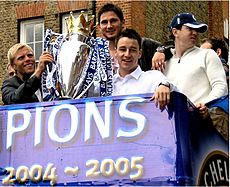
After Desailly left, the new Chelsea manager, José Mourinho, chose Terry as the club captain. This was a great choice. In the 2004–05 season, Chelsea won the Premier League title. They set records for the best defense and most points. Terry was voted Player of the Year by other professional players in England. He scored eight goals, including an important late goal against Barcelona. He was also named the best defender in the Champions League that season. In September 2005, he was chosen for the World XI team by professional footballers from 40 countries.
Chelsea won the Premier League title again in the 2005–06 season. They earned 91 points and secured the title with a 3–0 win against Manchester United.
On 14 October 2006, in a match against Reading, Terry had to play as a goalkeeper. Both Chelsea's goalkeepers were injured, and there were no more substitutes. Chelsea still won the game 1–0. On 5 November 2006, playing against Tottenham Hotspur, Terry received his first red card for Chelsea. Chelsea lost that game.
In the 2006–07 season, Terry missed some games because of a back problem. He had surgery on his back in December. He returned to play in February 2007. In a Champions League game against Porto, he hurt his ankle. He was expected to miss the 2007 League Cup final against Arsenal. However, he recovered quickly and played in the final. During the game, he was accidentally kicked in the face and was unconscious for a few minutes. He was taken off the field but returned to celebrate Chelsea's 2–1 win. He led Chelsea to the Champions League semi-final that year. In May 2007, Terry captained Chelsea in the first FA Cup final at the new Wembley Stadium.
In July 2007, Terry signed a new five-year contract with Chelsea. This made him one of the highest-paid players in the Premier League at the time.
On 16 December 2007, Terry broke three bones in his foot while playing against Arsenal. He recovered faster than expected. He captained Chelsea in the 2008 League Cup final against Tottenham, which Chelsea lost 2–1. On 11 May 2008, he dislocated his elbow in a game against Bolton. This injury did not stop him from playing in the 2008 UEFA Champions League final against Manchester United. The game went to penalties. Terry missed a penalty that would have won Chelsea the Champions League. Chelsea lost the shootout, and Terry was very upset. On 28 August 2008, UEFA gave Terry the Defender of The Year award.
On 13 September 2008, Terry received a red card against Manchester City. However, this decision was later overturned. He sometimes scored important goals for Chelsea, even as a defender.
Winning the Double and Champions League
In July 2009, Manchester City tried to sign Terry, but Chelsea's coach, Carlo Ancelotti, said Terry would stay. On 8 November 2009, Terry scored the winning goal in Chelsea's match against Manchester United. This helped Chelsea keep their perfect home record.
On 9 May 2010, Terry captained Chelsea to their fourth Premier League title. They won 8–0 against Wigan Athletic. A week later, on 15 May 2010, Terry captained Chelsea to win his fourth FA Cup medal. They beat Portsmouth 1–0 in the final at Wembley Stadium.
On 31 December 2011, Terry captained Chelsea for the 400th time. This was a club record. In 2011, Terry was very accurate with his passes. He completed 91.6% of his passes. Only two other players in the world had better accuracy.
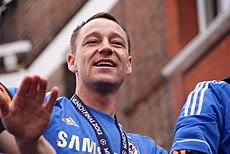
On 24 April 2012, Terry was sent off in a Champions League semi-final against Barcelona. Chelsea won the game overall and reached the final against Bayern Munich. Terry was suspended for the final. He scored his most goals in a season during the 2011-2012 season, with seven goals. Even though he was suspended for the Champions League final, he joined his teammates in celebrating after Chelsea won on penalty kicks.
Later Career at Chelsea
On 11 November 2012, Terry scored his 50th goal for Chelsea against Liverpool. He got injured in the same game and was out for a few months. He returned to play in January 2013. On 17 April 2013, Terry scored two goals in a derby match against Fulham. On 13 May 2014, Terry signed a new one-year contract with Chelsea.
On 18 October 2014, Terry captained Chelsea for the 500th time against Crystal Palace. In the next game, he scored in Chelsea's biggest Champions League win against Maribor. He also scored Chelsea's fastest-ever Champions League goal, after just 90 seconds, against Schalke 04.
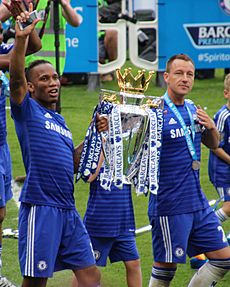
In the League Cup final on 1 March 2015, Terry scored the first goal. He was named Man of the Match in Chelsea's 2–0 win over Tottenham. On 26 March, he signed another one-year contract extension. On 26 April, Terry was voted into the PFA Premier League Team of the Year. On 29 April, he became the joint highest-scoring defender in the Premier League with 38 goals. On 10 May, he broke that record, scoring his 39th goal against Liverpool.
On 23 August 2015, Terry received a red card in a game against West Bromwich Albion. On 15 January 2016, he scored an own goal and then a goal for his team in a 3–3 draw against Everton. On 1 February 2016, Terry announced he would leave Chelsea in the summer of 2016. However, on 18 May 2016, he signed a new one-year contract to stay at Chelsea.
When Antonio Conte became the new Chelsea manager, he confirmed that Terry would remain the club captain. On 11 September 2016, Terry suffered an ankle injury against Swansea City. On 8 January 2017, he received a red card in an FA Cup game against Peterborough United. On 17 April, he announced he would leave Chelsea at the end of the season. Terry played his 717th and final match for Chelsea on 21 May 2017. He received a special guard of honor from his teammates. In December 2019, Chelsea fans voted Terry into the club's team of the decade.
Aston Villa Career
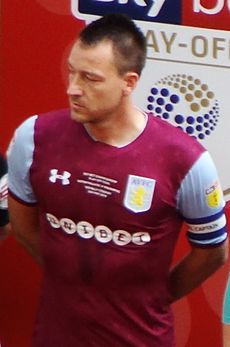
On 3 July 2017, Terry signed a one-year contract with Championship club Aston Villa. He became their captain for the 2017–18 season. He played his first game for Aston Villa on 5 August 2017. Terry scored his only goal for Aston Villa in a 2–1 win over Fulham on 21 October.
On 30 May 2018, Terry left Aston Villa after they did not get promoted to the Premier League. They lost 1–0 against Fulham in the play-off final. In September 2018, Terry considered joining Spartak Moscow but decided not to for family reasons. He announced his retirement from playing football on 7 October 2018.
International Career with England
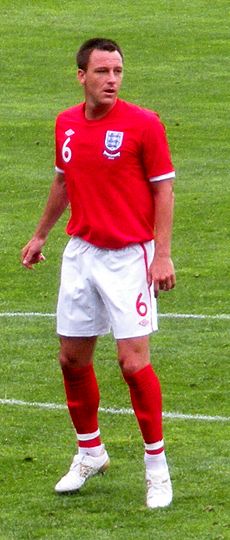
Terry played his first game for England in June 2003 against Serbia and Montenegro. His main defensive partner for England was Rio Ferdinand. He played for England in UEFA Euro 2004. England manager Sven-Göran Eriksson said Terry was his first-choice defender.
In 2005, Terry wore the England captain's armband for the first time during a World Cup qualifying match. He was chosen for the 2006 FIFA World Cup squad. On 30 May 2006, he scored his first goal for England in a warm-up match against Hungary. In a World Cup game against Trinidad and Tobago, Terry made an amazing overhead kick clearance off the goal line. He played in the quarter-final against Portugal, but England lost on penalties. Terry was the only English player named in the tournament's all-star squad.
On 10 August 2006, Steve McClaren named John Terry as the new England captain. McClaren believed Terry would be one of England's best captains. Terry scored a goal in his first game as captain against Greece. However, England did not qualify for UEFA Euro 2008 with Terry as captain. This was their first time missing a major tournament since 1994.
On 1 June 2007, Terry became the first player to score an international goal at the new Wembley Stadium. He scored with a header from a free kick by David Beckham against Brazil. He scored a similar header from a David Beckham free kick against the United States in May 2008.
Terry was confirmed as England captain again in August 2008. He captained England in the qualifying games for the 2010 FIFA World Cup. He scored his first competitive goal for England against Ukraine on 1 April 2009. England secured their place in the World Cup in September 2009.
On 5 February 2010, England manager Fabio Capello removed Terry as captain. Rio Ferdinand replaced him. At the 2010 FIFA World Cup, England had two draws. Terry hinted that he was not happy with the team's situation. Capello said Terry made a "very big mistake" by speaking to the media.
On 19 March 2011, Capello made Terry England captain again. However, on 3 February 2012, the Football Association (FA) removed Terry as captain for a second time. This led to Capello resigning.
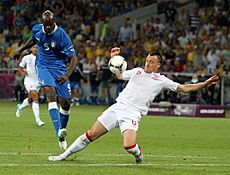
Terry was chosen for new manager Roy Hodgson's squad for UEFA Euro 2012. He played all four of England's matches at the Euros. Terry announced his retirement from international football on 23 September 2012.
How John Terry Played Football
ESPN described Terry as a "commanding, no-nonsense style of player." He was known for being strong and defending aggressively. He played as a centre-back, but he started as a midfielder when he was young. He was tall and very good at heading the ball. This helped him defend against crosses and also score goals.
Terry was known for his strong tackles. He was also a smart player. He was good at positioning himself and predicting what would happen in the game. This helped him even if he wasn't the fastest player, especially later in his career. He was also known for his leadership and bravery. He was great at organizing his team's defense.
Many people consider him one of the best defenders in the world during his peak. He is seen as one of the greatest English and Premier League defenders ever.
Coaching Career
On 10 October 2018, Terry became the assistant head coach for Aston Villa. He worked with head coach Dean Smith. On 26 July 2021, Terry left Aston Villa after three years. During that time, the club was promoted to the Premier League and stayed there. He said Dean Smith was a big influence on his coaching. In December 2021, it was announced he would return to Chelsea in a coaching role.
When Dean Smith became the new Leicester City manager on 10 April 2023, he asked Terry to join his coaching staff again. In July 2023, Terry returned to Chelsea as an Academy coach.
Baller League UK
In November 2024, it was announced that John Terry will manage one of the 12 teams in the new Baller League UK. This is a six-a-side football league.
Sponsorships
John Terry appeared on the front cover of the UK version of Pro Evolution Soccer 6. He was alongside Brazilian international player Adriano.
Family and Personal Life
Terry is married to his childhood sweetheart, Toni (née Poole). On 18 May 2006, they had twins, a boy and a girl. They got married at Blenheim Palace in June 2007.
When he was growing up, Terry supported Manchester United. His older brother, Paul, was also a professional footballer. Terry's nephew, Frankie, is currently a professional footballer.
In 2016, Terry paid for the funeral costs of an eight-year-old Chelsea fan. The child had leukaemia and sadly passed away.
Terry is a co-owner of a swimwear company called Thomas Royall. He owns it with other footballers, Sam Saunders and Liam Ridgewell.
Career Statistics
Club
| Club | Season | League | FA Cup | League Cup | Europe | Other | Total | |||||||
|---|---|---|---|---|---|---|---|---|---|---|---|---|---|---|
| Division | Apps | Goals | Apps | Goals | Apps | Goals | Apps | Goals | Apps | Goals | Apps | Goals | ||
| Chelsea | 1998–99 | Premier League | 2 | 0 | 3 | 0 | 1 | 0 | 1 | 0 | — | 7 | 0 | |
| 1999–2000 | Premier League | 4 | 0 | 4 | 1 | 1 | 0 | 0 | 0 | — | 9 | 1 | ||
| 2000–01 | Premier League | 22 | 1 | 3 | 0 | 1 | 0 | 0 | 0 | 0 | 0 | 26 | 1 | |
| 2001–02 | Premier League | 33 | 1 | 5 | 2 | 5 | 0 | 4 | 1 | — | 47 | 4 | ||
| 2002–03 | Premier League | 20 | 3 | 5 | 2 | 3 | 0 | 1 | 1 | — | 29 | 6 | ||
| 2003–04 | Premier League | 33 | 2 | 3 | 1 | 2 | 0 | 13 | 0 | — | 51 | 3 | ||
| 2004–05 | Premier League | 36 | 3 | 1 | 1 | 5 | 0 | 11 | 4 | — | 53 | 8 | ||
| 2005–06 | Premier League | 36 | 4 | 4 | 2 | 1 | 1 | 8 | 0 | 1 | 0 | 50 | 7 | |
| 2006–07 | Premier League | 28 | 1 | 4 | 0 | 2 | 0 | 10 | 0 | 1 | 0 | 45 | 1 | |
| 2007–08 | Premier League | 23 | 1 | 2 | 0 | 2 | 0 | 10 | 0 | 0 | 0 | 37 | 1 | |
| 2008–09 | Premier League | 35 | 1 | 4 | 0 | 1 | 0 | 11 | 2 | — | 51 | 3 | ||
| 2009–10 | Premier League | 37 | 2 | 5 | 1 | 1 | 0 | 8 | 0 | 1 | 0 | 52 | 3 | |
| 2010–11 | Premier League | 33 | 3 | 3 | 0 | 1 | 0 | 8 | 1 | 1 | 0 | 46 | 4 | |
| 2011–12 | Premier League | 31 | 6 | 4 | 0 | 1 | 0 | 8 | 1 | — | 44 | 7 | ||
| 2012–13 | Premier League | 14 | 4 | 3 | 1 | 1 | 0 | 8 | 1 | 1 | 0 | 27 | 6 | |
| 2013–14 | Premier League | 34 | 2 | 0 | 0 | 1 | 0 | 12 | 0 | — | 47 | 2 | ||
| 2014–15 | Premier League | 38 | 5 | 0 | 0 | 4 | 1 | 7 | 2 | — | 49 | 8 | ||
| 2015–16 | Premier League | 24 | 1 | 2 | 0 | 2 | 0 | 4 | 0 | 1 | 0 | 33 | 1 | |
| 2016–17 | Premier League | 9 | 1 | 3 | 0 | 2 | 0 | — | — | 14 | 1 | |||
| Total | 492 | 41 | 58 | 11 | 37 | 2 | 124 | 13 | 6 | 0 | 717 | 67 | ||
| Nottingham Forest (loan) | 1999–2000 | First Division | 6 | 0 | — | — | — | — | 6 | 0 | ||||
| Aston Villa | 2017–18 | Championship | 32 | 1 | 1 | 0 | 0 | 0 | — | 3 | 0 | 36 | 1 | |
| Career total | 530 | 42 | 59 | 11 | 37 | 2 | 124 | 13 | 9 | 0 | 759 | 68 | ||
International
| National team | Year | Apps | Goals |
|---|---|---|---|
| England | 2003 | 6 | 0 |
| 2004 | 9 | 0 | |
| 2005 | 6 | 0 | |
| 2006 | 14 | 2 | |
| 2007 | 7 | 1 | |
| 2008 | 6 | 2 | |
| 2009 | 10 | 1 | |
| 2010 | 7 | 0 | |
| 2011 | 7 | 0 | |
| 2012 | 6 | 0 | |
| Total | 78 | 6 | |
- England score listed first, score column indicates score after each Terry goal
| No. | Date | Venue | Cap | Opponent | Score | Result | Competition | Ref. |
|---|---|---|---|---|---|---|---|---|
| 1 | 30 May 2006 | Old Trafford, Manchester, England | 23 | 2–0 | 3–1 | Friendly | ||
| 2 | 16 August 2006 | Old Trafford, Manchester, England | 30 | 1–0 | 4–0 | Friendly | ||
| 3 | 1 June 2007 | Wembley Stadium, London, England | 38 | 1–0 | 1–1 | Friendly | ||
| 4 | 28 May 2008 | Wembley Stadium, London, England | 44 | 1–0 | 2–0 | Friendly | ||
| 5 | 19 November 2008 | Olympiastadion, Berlin, Germany | 48 | 2–1 | 2–1 | Friendly | ||
| 6 | 1 April 2009 | Wembley Stadium, London, England | 51 | 2–1 | 2–1 | 2010 FIFA World Cup qualification |
Honours and Awards
Chelsea
- Premier League: 2004–05, 2005–06, 2009–10, 2014–15, 2016–17
- FA Cup: 1999–2000, 2006–07, 2008–09, 2009–10, 2011–12; runner-up: 2001–02, 2016–17
- Football League Cup: 2004–05, 2006–07, 2014–15; runner-up: 2007–08
- FA Community Shield: 2005, 2009
- UEFA Champions League: 2011–12; runner-up: 2007–08
- UEFA Europa League: 2012–13
Individual
- Chelsea Player of the Year: 2000–01, 2005–06
- Premier League Player of the Month: January 2005
- Alan Hardaker Trophy: 2005, 2015
- PFA Players' Player of the Year: 2004–05
- PFA Team of the Year: 2003–04 Premier League, 2004–05 Premier League, 2005–06 Premier League, 2014–15 Premier League
- FIFA FIFPro World XI: 2004–05, 2005–06, 2006–07, 2007–08, 2008–09
- ESM Team of the Year: 2004–05, 2008–09, 2009–10
- UEFA Club Defender of the Year: 2005, 2008, 2009
- UEFA Team of the Year: 2005, 2007, 2008, 2009
- FIFA World Cup All-Star Team: 2006
- PFA Team of the Century (1997–2007): 2007
See also
 In Spanish: John Terry (futbolista) para niños
In Spanish: John Terry (futbolista) para niños
- List of footballers with 100 or more UEFA Champions League appearances
 | Jackie Robinson |
 | Jack Johnson |
 | Althea Gibson |
 | Arthur Ashe |
 | Muhammad Ali |


